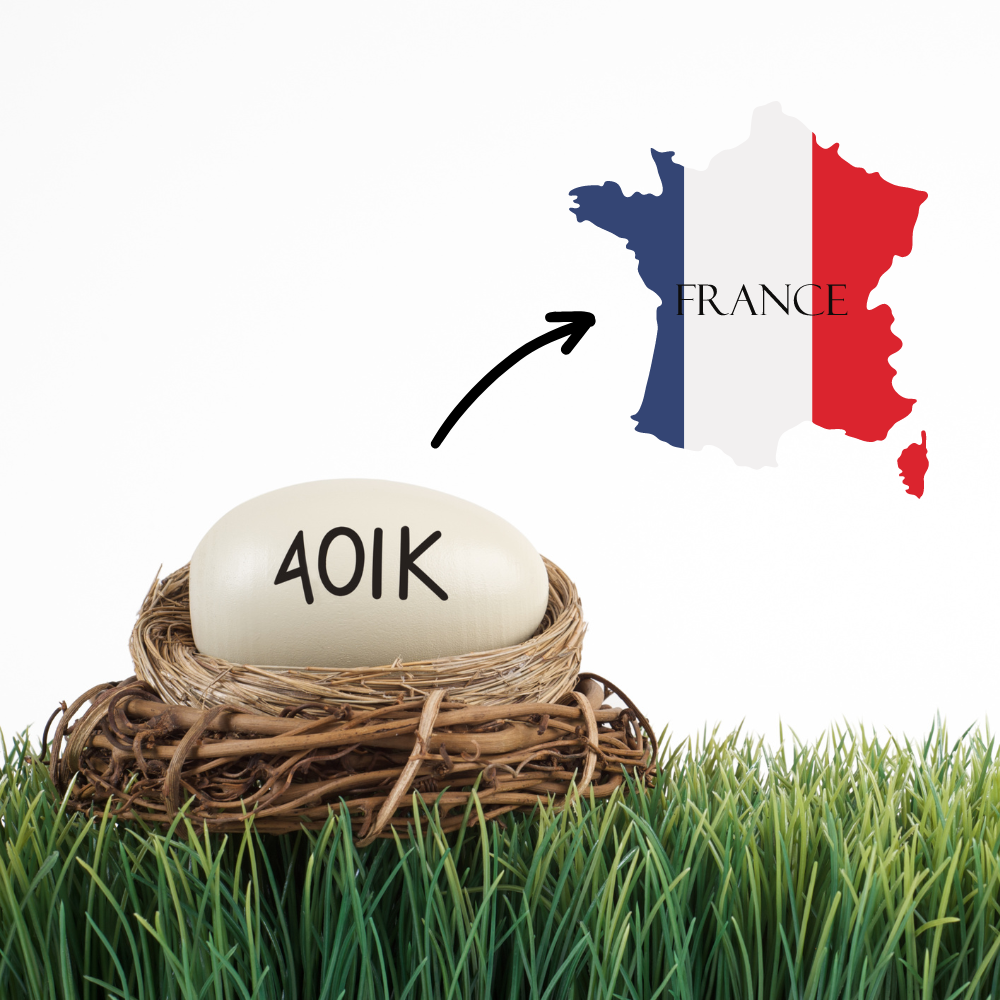
Have you been asking yourself if I can transfer a 401(k) to France? Many Americans in France face a lot of hurdles when dealing with their American retirement accounts. With the complex web of U.S. and French restrictions, it’s difficult for American expats to know how to manage their retirement finances. This article explores the restrictions of American retirement accounts and the best course of action for U.S. expats.
What is a 401(k) exactly?
A 401(k) is a retirement savings account offered by employers in the United States. Employees can contribute a part of their pre-tax income to the plan, thus reducing their taxable income for the year, and most employers match the contribution, essentially providing free money for their retirement savings. The money will grow tax-deferred within the account, and you only pay taxes on these gains when you withdraw the funds – normally during retirement when you have a lower marginal tax rate.
401(k) constraints
- Annual Limits: The IRS sets annual limits on contributions, which in 2024 is $22,500 for individuals under 50 and $69,000 for those 50 and over.
- Early Withdrawals: Withdrawing funds from a 401(k) before the age of 59.5 will incur a 10% penalty in addition to regular income taxes, except for specific exceptions.
- Required Minimum Distributions (RMDs): You are required to start taking mandatory withdrawals (RMDs) from your 401(k) once you reach the age of 72. (or 73 if born after June 30, 1949) These withdrawals are taxed as income, and there is a 50% penalty if you fail to withdraw the correct amount.
- Limited options: The investment options in a 401(k) plan are chosen by the employer and often do not have much flexibility.
- Fees: There are often fees associated with a 401(k) plan, such as administrative fees and costly expense ratios for the investment options.
- Loan limitations: Some 401(k) plans allow participants to take loans from their accounts, but there are limitations on the amount and the repayment terms.
Additional Restrictions for US expats in France
With the rise of Americans living in France and the new digital nomads, many people with a 401(k) plan from a previous employer will find themselves suddenly subjected to the complex rules of US expats.
- Foreign address: If you switch over your banking and investing to your new French address, you will soon see that most US banks and financial institutions do not accept a foreign address and will simply close your account.
- Financial products: certain financial products, most notably U.S. mutual funds, require the investor to be based in the United-States, and inversely are not allowed in Europe and for European residents.
- FATCA and FBAR: In 2014, the United-States imposed the Foreign Account Tax Compliance Act (FATCA) on all foreign banks with U.S. clients. It has resulted in many French banks not wanting to work with American clients, limiting the banking options for U.S. expats in France.
What to do if you want to transfer a 401k to France
If you no longer receive the employer match in your 401(k), the best option is to simply rollover your 401(k) to an IRA retirement account with a custodian that accepts a French address. At Harrison Brook, we have done the legwork to find the partners that are happy to work with expats such as Americans living in France. This solution allows a lot more flexibility and many more advantages:
- Continued tax deferral: With an IRA, your savings continue to grow tax-deferred just like in a 401(k).
- More investment choices: A big advantage is that IRAs offer an unlimited range of investment options. We have the freedom to choose the specific assets we want to invest in so as to tailor your portfolio to your own risk tolerance and retirement goals.
- Lower fees: IRAs have lower fees and provide access to investment options with lower expense ratios which won’t eat into your returns.
- Consolidated management: It´s possible to combine many 401(k)s into one IRA, making it easier to track your investments and manage your overall retirement plan.
To Roth or not to Roth?
In addition to the traditional 401(k) plans, some people may also have a Roth 401(k). The big difference is that the contributions in a Roth 401(k) are after-tax, but the withdrawals will be tax-free. Roth 401(k)s are subjected to the same constraints as their traditional counterpart, but also have an additional income limitation.
Investors can typically rollover a traditional 401(k) to traditional IRA, and Roth 401(k) to Roth IRA, but there is also the possibility of Roth conversions, which would move money from a traditional account to a Roth account. If done properly, it can have some significant tax advantages, and we suggest talking with a cross-border advisor at Harrison Brook to see if it’s the right option for you.
Peace of mind with a US expat financial specialist
If you are considering complex rollovers or conversions of your retirement accounts, with the added restrictions of living overseas, we recommend contacting a cross-border advisor at Harrison Brook to optimize your investments and avoid costly mistakes. Harrison Brook is here to assist you in managing your financial assets, so don’t hesitate to book a meeting with us.
